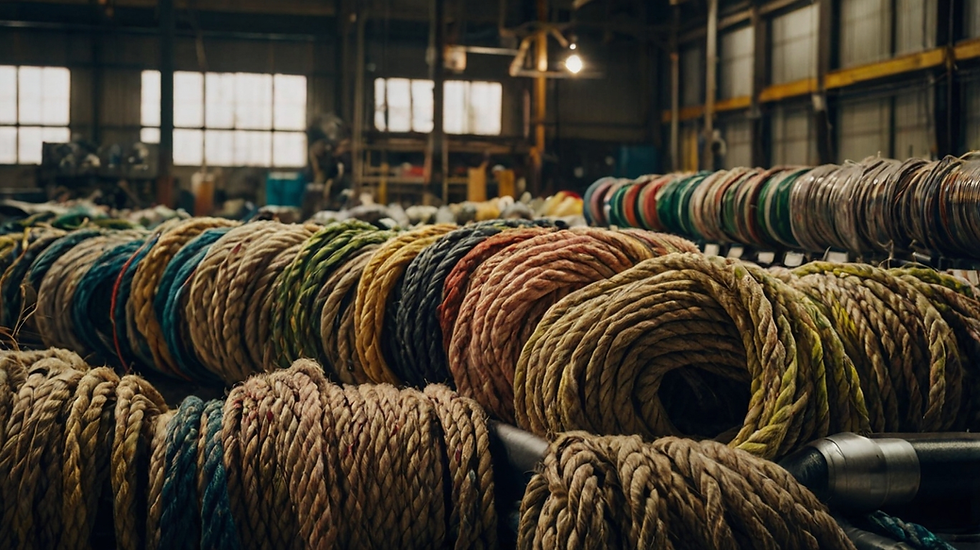Nylon Braided Ropes vs. Other Ropes: A Comparative Guide
- taianstar
- Dec 20, 2024
- 3 min read

Ropes are essential tools in countless industries, from marine navigation to construction, outdoor recreation, and beyond. They serve as a reliable means of lifting, pulling, and securing loads. Among the many options available, nylon braided ropes stand out as a superior choice for their strength and resilience. But how do they compare to other types of ropes, such as polypropylene, cotton, polyester, or hemp? This guide dives deep into the comparison to help you make an informed decision.
What Are Nylon Braided Ropes?
Nylon braided ropes are ropes made from synthetic nylon fibers woven into a braided structure. This unique design ensures enhanced durability, flexibility, and resistance to wear and tear. Unlike twisted ropes, braided ropes provide better tensile strength and smoother handling.
Key features of nylon braided ropes include:
High tensile strength: Capable of withstanding heavy loads without snapping.
Flexibility: Easily bent and maneuvered without compromising integrity.
Resistance: Effective against weather, abrasion, and chemicals.
Common Types of Ropes
Before diving into comparisons, let’s explore the common types of ropes:
Polypropylene Ropes: Lightweight and economical but lacks UV and heat resistance.
Cotton Ropes: Soft, natural fiber ropes ideal for decorative or light-duty purposes but prone to rot when exposed to moisture.
Polyester Ropes: Strong and weather-resistant but less elastic than nylon.
Hemp Ropes: Natural, biodegradable ropes with moderate strength but limited durability in harsh conditions.
Strength and Durability: Nylon Braided Ropes vs. Others
When it comes to strength, nylon braided ropes outperform most alternatives. For instance:
Polypropylene ropes can stretch but are less durable under tension.
Cotton ropes are weak and deteriorate quickly when exposed to moisture.
Polyester ropes are strong but lack the elasticity of nylon.
Nylon’s ability to absorb shock loads without breaking makes it a go-to option for demanding applications like towing and climbing. Furthermore, its resistance to abrasion ensures long-lasting performance.
Flexibility and Ease of Use
Nylon braided ropes are known for their superior flexibility. They are easy to knot and handle, which makes them ideal for activities requiring precision, like boating or securing cargo. In contrast:
Cotton ropes tend to stiffen over time, especially when wet.
Polypropylene ropes may feel slippery and less user-friendly.
If you need a rope that combines strength with flexibility, nylon braided ropes are hard to beat.
Resistance to Environmental Factors
Nylon braided ropes shine in tough environments. They resist:
Water absorption: Unlike cotton ropes, nylon remains strong and unaffected when wet.
UV rays: Though polypropylene degrades under sunlight, nylon retains its integrity.
Chemicals and oils: Nylon’s synthetic nature makes it less vulnerable to damage from harsh substances.
This makes nylon braided ropes particularly valuable in marine, industrial, and outdoor settings where exposure to these elements is unavoidable.
Cost Comparison
Initially, nylon braided ropes might seem more expensive than alternatives like cotton or polypropylene. However, their long-term value is undeniable:
They last significantly longer, reducing replacement costs.
They perform reliably, minimizing risks of failure or damage.
For those who prioritize quality and durability, nylon braided ropes offer a cost-effective investment.
Applications of Nylon Braided Ropes
The versatility of nylon braided ropes is unmatched. They’re commonly used in:
Marine activities: Dock lines, anchor ropes, and fishing nets.
Climbing and safety harnesses: Due to their strength and shock absorption.
Industrial tasks: Towing, lifting, and securing heavy equipment.
Their adaptability makes them indispensable across various industries.
Customization Options for Nylon Braided Ropes
One of the standout features of nylon braided ropes is their customization potential. You can choose:
Thickness: Tailored to handle specific load capacities.
Colors: For branding or safety purposes.
Length and strength: To meet unique project requirements.
Conclusion
When comparing nylon braided ropes to other types, the advantages are clear: they are stronger, more durable, and better suited for demanding applications. Whether you’re looking for flexibility, environmental resistance, or long-term value, nylon braided ropes deliver on all fronts.
FAQs
What are the main uses of nylon braided ropes? Nylon braided ropes are commonly used in marine, industrial, and outdoor applications due to their strength and durability.
How do nylon braided ropes compare to cotton ropes in wet conditions? Nylon braided ropes outperform cotton ropes, as they don’t rot or lose strength when exposed to moisture.
Are nylon braided ropes more expensive than polypropylene ropes? Yes, but they offer better durability, strength, and resistance, making them a worthwhile investment.
Can nylon braided ropes be used for climbing? Absolutely! Their shock-absorbing qualities and strength make them ideal for climbing and safety harnesses.
How can I customize nylon braided ropes for specific needs? Customization options include varying thickness, length, and color. For details, visit the Blogger post linked above.




Comments